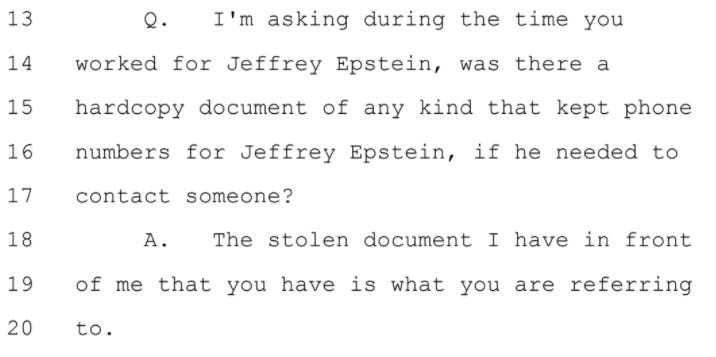The Black Book - Ghislaine Maxwell Trial Day 10
In dueling letters between the government (on Wednesday, the 8th) and the defense (submitted Thursday, the 9th), the counsels debated the fate of gx52, Jeffrey Epstein’s infamous little black book, containing the contact information for the rich and powerful milieu which Epstein and Ghislaine Maxwell inhabited.
On December 2nd the court withheld its judgement on whether or not to allow the book to be submitted. They were waiting to hear what the testimony of Juan Alessi would say. At the time, the government expected to call Employee-1 in to further testify to the authenticity of the book. Since then, the government decided to no longer call that witness to testify. But, they claimed in their letter on the 8th, they had submitted additional evidence that confirmed the authenticity of the book.
The government cited United States v. Gagliardi, 506 F.3d 140, 151 (2d Cir. 2007), which holds that the “standard for authentication is one of ‘reasonable likelihood’ and is ‘minimal.’ The testimony of a witness with knowledge that a matter is what it is claimed to be is sufficient to satisfy this standard.”
Alessi’s testimony that gx52 was “the same ‘type of book,’” with the “same binding” and layout as the books he remembered would meet this standard.
“Alessi recognized Government Exhibit 52,” the government’s letter read, “as a book that belonged to Epstein and Maxwell, consistent with his experience working for them.”
Because the bar for admissibility is generally low, the government argued, all this was enough to enter it into evidence. Weight (how important the jury should consider it during their deliberations) is a whole other matter.
“Defects in chain of custody go to weight and not admissibility,” wrote the government.
The government also claimed that in testimony from Maxwell for an April 2016 deposition in a civil case Virginia Giuffre brought against Maxwell, Maxwell confirmed the authenticity of the document.
In that deposition Maxwell was presented with the document, which she said was stolen. When asked if she thought it was authentic, she said it was “a copy of a stolen document.” Maxwell said she was familiar with the “actual document.”
The defense’s letter in response, filed on December 9th, said that the document Maxwell was presented with in the 2016 deposition was photocopied pages of a document, not the bound document the government was trying to submit into the record.
“Quite simply,” the defense wrote, “Ms. Maxwell was not asked and did not testify about Exhibit 52 or its authenticity.”
The defense also tried to undermine the claim that Maxwell authenticated the document at all in her deposition by citing portions of the deposition transcripts which the government submitted into evidence the day before:
Q. You were involved in the creation of this document?
A. I think you can see from the date that it’s 2004, 2005, so no.
And they showed that Maxwell affirmed she played no role in creating the little black book:
Q. Did you ever have to keep track of address or phone contact information for Jeffrey Epstein?
A. That was not my job.
Q. Did you ever do it?
A. I am not responsible for keeping his numbers so that wasn’t my job at all.
“The government’s attempt to authenticate Exhibit 52 through Ms. Maxwell’s testimony about something else entirely fails,” wrote the defense.
They went on to say that citing Maxwell’s 2016 deposition was a desperate move by the government, who had failed to authenticate the exhibit as having been Maxwell’s book, something they tried to argue when they first introduced it.
“No witness has testified that it was Ms. Maxwell’s book,” wrote the defense, “and the government has abandoned that argument.”



